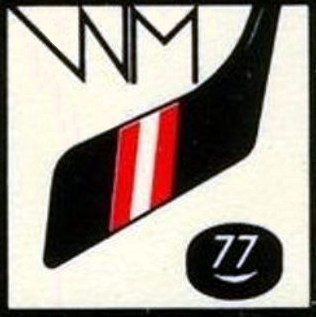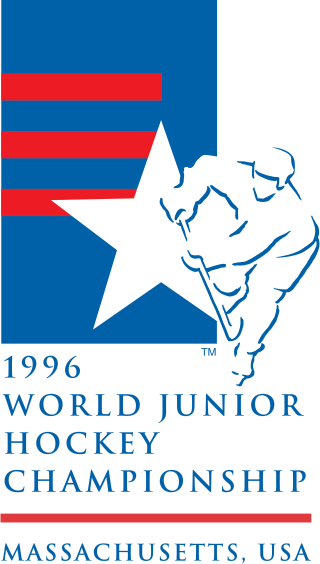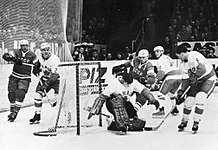
The Ice Hockey World Championships are an annual international men's ice hockey tournament organized by the International Ice Hockey Federation (IIHF). First officially held at the 1920 Summer Olympics. The IIHF was created in 1908 while the European Championships, the precursor to the World Championships, were first held in 1910. The tournament held at the 1920 Summer Olympics is recognized as the first Ice Hockey World Championship. From 1920 to 1968, the Olympic hockey tournament was also considered the World Championship for that year.

The 2004 IIHF World Women's Championships were held March 30 – April 6, 2004 in Halifax and Dartmouth, Canada at the Halifax Metro Centre, and the Dartmouth Sportsplex. The Canadian national women's hockey team won their eighth straight World Championships. The event had 9 teams, because the 2003 event was cancelled due to the SARS epidemic, therefore no teams were relegated and the winners of the 2002 and 2003 Division I tournaments qualified. Canada won their 37th consecutive World Championship game before losing 3–1 in their third game. They later avenged their loss to the US by defeating them in the gold medal game 2–1. Sweden and Finland also met each other twice, with Finland winning the bronze medal game 3–2 improving on the earlier draw.
The men's ice hockey tournament at the 1964 Winter Olympics in Innsbruck, Austria, was the tenth Olympic Championship, also serving as the 31st World Championships and the 42nd European Championships. The games were held at the Olympiahalle Innsbruck.

Ice hockey tournaments have been staged at the Olympic Games since 1920. The men's tournament was introduced at the 1920 Summer Olympics and was transferred permanently to the Winter Olympic Games program in 1924, in France. The women's tournament was first held at the 1998 Winter Olympics.

The 1965 Ice Hockey World Championships took place in Hakametsä, Tampere, Finland, 3–15 March. Eight teams took part, each playing each other once. The Soviets became world champions for the fifth time, winning all of their games. This also counted as their ninth European title, with the Czechs finishing second and the Swedes third. For the third straight year Canada finished fourth. The tournament employed new tie-breaking rules, which some believed were supposed to be in place for the Innsbruck Olympics. To decide medals priority would be given to the team who won the head-to-head game, unless they tied, or more than two teams were tied. In those two cases goal differential would be used, but only the goal differential between the top four teams.
The 1992 Men's Ice Hockey World Championships was the 56th such event sanctioned by the International Ice Hockey Federation (IIHF). Teams representing a record 32 countries participated in several levels of competition. The competition also served as qualifications for group placements in the 1993 competition.

The 1991 Men's Ice Hockey World Championships was the 55th such event sanctioned by the International Ice Hockey Federation (IIHF), and at the same time served as the 66th and last Ice Hockey European Championships. Teams representing 25 countries participated in several levels of competition. The competition also served as qualifications for group placements in the 1992 competition.
The 1987 Ice Hockey World Championships was the 52nd such event hosted by the International Ice Hockey Federation. It was also the 63rd European Championships. Teams representing 28 countries participated in four levels of competition.

The 1985 Ice Hockey World Championships took place in Prague, Czechoslovakia from 17 April to 3 May. Eight teams took part, with each team playing each other once. The four best teams then played each other once more with no results carrying over, and the other four teams played each other again to determine ranking and relegation. This was the 50th World Championships, and also the 61st European Championships of ice hockey. The home side, Czechoslovakia, became world champions for the 6th time, and the Soviet Union won their 23rd European title. For the European Championship, only games between European sides in the first round are included.
The 1982 Ice Hockey World Championships took place in Finland from the 15 April to the 29 April. The games were played in Helsinki and Tampere with eight teams playing a single round-robin, followed by the top four teams playing each other once more. This was the 48th World Championships, and also the 59th European Championships of ice hockey. The Soviet Union became World Champions for the 18th time, and also won their 21st European Championship.
The 1978 Ice Hockey World Championships took place in Prague, Czechoslovakia from 26 April to 14 May. Eight teams took part, with each team playing each other once in the first round, and then the four best teams meeting in a new round. This was the 45th World Championships, and also the 56th European Championships. The USSR won for the 15th time, narrowly defeating the incumbent Czechoslovaks.

The 1977 Ice Hockey World Championships took place in Vienna, Austria from 21 April to 8 May. Eight teams took part, first playing each other once, then the four best teams advancing to a new round. The tournament was also the 55th ice hockey European Championship. Czechoslovakia won for the fifth time, and second in a row, claiming their 14th and final European title as well.
The 1976 Ice Hockey World Championships were the 43rd Ice Hockey World Championships and the 54th European Championships in ice hockey. The tournament took place in Poland from 8 to 25 April, and the games were played in Katowice. Eight teams took part in the main tournament, with each team first playing each other once. The four best teams then took part in a medal play off, and the teams placed 5–8 took part in a relegation play-off. The teams took the results from the first round through to the second round with them.

The Canadian men's national under-20 ice hockey team is the ice hockey team representing Canada internationally in under-20 competition. Their primary participation in this age group comes at the International Ice Hockey Federation's World Junior Championship, held annually every December and January. The team also participates in various exhibition matches and occasional exhibition series, such as the 2007 Super Series against their Russian counterparts, an eight-game exhibition series commemorating the 35th anniversary of the 1972 Summit Series.

The 1996 World Junior Ice Hockey Championships was the 20th edition of the Ice Hockey World Junior Championship, hosted in Massachusetts, United States. The tournament was won by Canada—defeating Sweden 4–1 in the gold-medal game—earning Canada their fourth straight gold medal and ninth overall, tying the Soviet team's record in both regards.

The 1954 Ice Hockey World Championships, were the 21st World Championships and 32nd European ice hockey championships were held from 26 February to 7 March 1954 in Stockholm, Sweden. Every team played each other once with the top three finishers receiving medals at the end. The USSR won in its first attempt, led by Vsevolod Bobrov who was recognized as the best forward of the tournament in the first ever presentation of Directorate Awards.
The 1971 Ice Hockey World Championships was the 38th edition of the Ice Hockey World Championships, which also doubled as the 49th European ice hockey championships. The Pool A, Pool B and Pool C tournaments were hosted by the following nations:
The 1970 Ice Hockey World Championships was the 37th edition of the Ice Hockey World Championships. 21 nations participated in three different divisions or pools:
The 1969 Ice Hockey World Championships was the 36th edition of the Ice Hockey World Championships, which also doubled as the 47th European ice hockey championships. For the first time the Pool A, B and C tournaments were hosted by different nations:

The 1966 Ice Hockey World Championships was the 33rd edition of the Ice Hockey World Championships. The tournament was held in Hala Tivoli, Ljubljana, SR Slovenia, SFR Yugoslavia from 3 to 14 March 1966. For the fourth straight year, the Soviet Union won the tournament. For the Soviets, it was their sixth World and tenth European title. Czechoslovakia beat both Canada and Sweden two to one, to take the Silver, while the Swedes' historic loss to East Germany helped put them fourth behind Canada for the Bronze.











